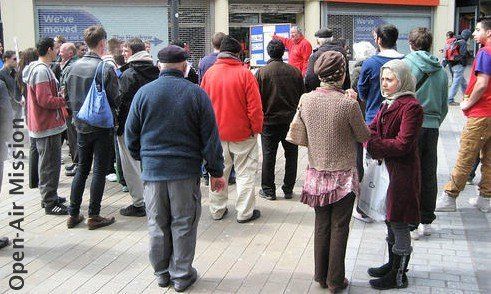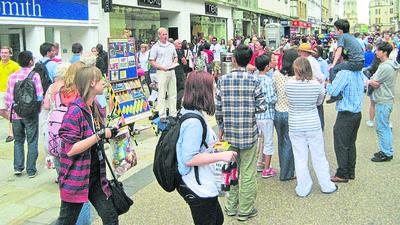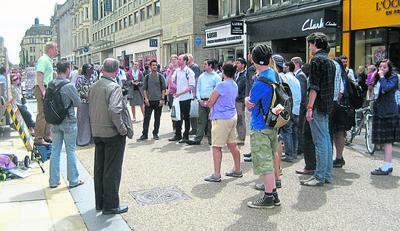
It happened to Peter, Paul and Silas. It would also have happened to our Lord himself had the Pharisees had their way. What happened? They preached publicly in the open air, incurred the displeasure of the authorities and spent time in prison as a result.
It is not new to preach in the open air and bring the message of the Lord Jesus Christ to men and women as they go about their business. In fact, open-air preaching probably has been going on longer than preaching inside buildings! Paul tells us explicitly that he preached in the market place. Generations of preachers have realized that people of the world basically have no interest in the gospel and invariably will find more important pastimes than spending an hour in church listening to someone preach. Consequently, some of these preachers have been challenged to take their message to the people since the people will not come to the message.
New developments
Recently street-preaching groups in Leeds, York and other British cities have been arrested and detained by the police. In doing so they continue a long tradition of preachers who have tussled with the law enforcers of their day. They have also provided headlines for newspapers such as ‘Preachers guilty of refusing to quit inferno’ and have allowed the press to make some sport with the serious business of Christian witnessing. ‘Dante’s Inferno’ is the local name of an area of York heavily endowed with drinking-dens. The preachers were accused of obstructing police by refusing to stop giving revellers a sermon on the evils of drink as the pubs emptied at closing time. Police claimed the preachers had to be arrested for their own safety. The group members denied all charges but were given a twelve-month conditional discharge and ordered to pay £70 costs anyway. Subsequently, a campaign was launched by sympathizers of the preachers claiming breach of civil liberties, censorship and police harassment.
There are concerns here about trends in both street preaching and policing. There is little to be gained in arriving at a situation of mutual chafing and intolerance between preachers and police which appears to have happened in some recent cases. Reports from these towns suggest that simply the appearance of street preachers is a cue for police to move in and end the meeting.

Although for many years the right to preach the gospel in public places has been respected by police and public alike, this has not always been the case. From apostolic times preachers have been attacked, and during the eighteenth-century revival stick-wielding gangs could be hired by local dignitaries to assault preachers and break up meetings. Some preachers have been killed in these mêlées. One of John Knox’s early responsibilities at open-air gatherings was to carry a large broad sword to deter anyone from endeavouring to stop George Wishart from delivering God’s Word. Such measures would be excessive today.
The thin blue line
On the other hand, few would disagree that police officers today have a difficult time containing certain elements within our society, especially where alcohol is involved. There are people who look for any opportunity to cause trouble. Street preachers ought to be conscious of this. In the tinder-box environment of closing time in city-centre pubs, be it the ‘Inferno’ or anywhere else, the police will be anxious to know who is striking matches! Perhaps to a lesser, but no less real, extent busy city centres on Saturday mornings are potential flashpoints.
Of course, we expect police officers to act professionally and courteously in the exercise of their duties. This is not always the case and individual police officers will let their profession down from time to time. The ET researcher who called the North Yorkshire Police press office found the officer there to be rude, crude and purposefully obstructive. Thankfully this attitude was not reflected in other forces contacted who after consulting colleagues supplied the guidelines applied by officers in dealing with any gathering in a public place.
Police officers are obliged to attend complaints made by members of the public, for example a shopper or shopkeeper might call the police for any number of reasons. In general, police officers will consider three things when assessing the complaint about meetings in public place.
Three areas of concern
Firstly, is the location actually a public place? This may seem clear to the preacher but increasingly shopping malls and town centres are owned by private concerns who may have banned unauthorized gatherings on their premises. In addition, some local byelaws prohibit gatherings.
Secondly, is the preacher (or speaker – the police make no distinction about who is speaking or, at this stage, the content of the message) or his companions obstructing the highway in any way? Obstructing access or passage is a clear reason for being asked to desist and move on.
Thirdly, is the conduct of the preacher (speaker) likely to lead to a breach of the peace? This guideline allows the police officer to assess the nature of the meeting, the content of the message, the attitude of the speaker and the listeners, and a whole host of circumstances which might impinge on the situation, including the nature and intensity of the original complaint. The first two criteria are matters of fact, this third point is largely a matter of opinion. Usually, whether any situation is likely to lead to a breach of the peace will be determined by the immediate environment and the experience of the police officer present.

Thousands of meetings
It is worth mentioning that it is only a few groups who have difficult confrontations with the police and it is entirely possible that there are a few groups who wish to make a crusade of their evangelism. Persecution for one’s faith is a handy interpretation of any opposition met by religious groups, be they Christian or otherwise. Often the more marginal and extreme the group the more prone to feelings of persecution. As one veteran open-air preacher said, ‘It is very easy to get arrested and the incident makes wonderful headlines.’
On the other hand there are many thousands of open-air meetings that go on every year without confrontation or incident of any kind. Open Air Mission, for example, conducts over 2,500 meetings per annum in nearly fifty different towns. It advises street preachers to cultivate a friendly relationship with authorities and police. It recommends that before meetings are held a letter be sent to the local Chief Constable stating that a group from a certain church or churches plan to hold open-air meetings at a particular time each week at a certain place. The letter could point out that you are aware you must not cause a disturbance or obstruction and say that you will ensure these conditions are kept as you want to assist the police in the discharging of their duty. Ask him to let you know if there are any objections or questions. This letter is not asking permission, it is stating what you intend to do.
This will usually prompt a reply stating that your plans have been noted and the constables who will be in that area have been informed. Thereafter, if you are stopped you can show this letter to the police officers concerned and this will usually mean that they will allow the meeting to continue. Always co-operate with the policeman in the street, even if this means stopping a very promising meeting; then take the matter up with their superiors before the next meeting is due. Aim to be courteous at all times and firm if necessary. Remember that you are an ambassador for Christ.

Free speech
The right of free speech provides Christians with an opportunity to take the gospel message into their community in an effective way. Such privilege has not always been enjoyed in our country and many have paid a high price to secure free speech for us. Christians must continue to value and uphold such rights but this includes being wise about how to use them. Freedom of speech is not an exercise in citizens’ rights. We need to be aware that we are confronting our hearers in a way some will find confrontational, even threatening. It is our right to take the opportunity to win the hearts and minds of men for Christ by communicating the gospel in this manner and certainly not one to be abused. If our neighbours do not appreciate our concern for their souls or their privilege in hearing of Jesus Christ crucified we ought not to be surprised. Many testify to faith graciously bestowed after many years of ridiculing the gospel.
Free grace
Christians are not called to be successful, but we are called to be faithful. Faithful preaching is the best gift we can leave to our community. It is as Christ is preached that sinners are saved by the sovereign call of God. Paul wrote to Rome, ‘How then shall they call on him in whom they have not believed? and how shall they believe in him of whom they have not heard? and how shall they hear without a preacher?’ Paul knew what it was to be persecuted and imprisoned for his faith. He knew, too, how essential it was to have a preacher on the street.




